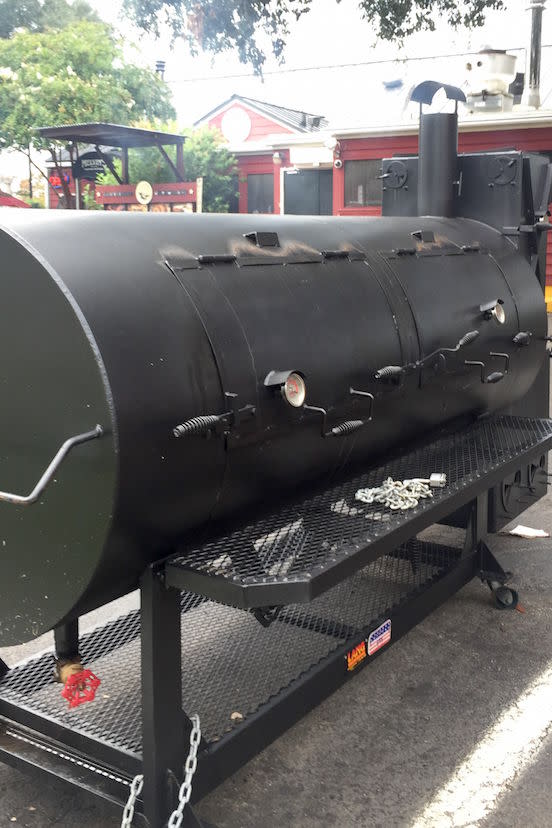A South Carolina BBQ Icon Returns to All-Wood Cooking
Earlier this summer, I reported on some of the recent changes that owner David Bessinger has put in place at Melvin’s Barbecue, one of the iconic representatives of the Midlands South Carolina style of mustard-based barbecue. Those innovations include some decidedly non-local twists, like serving Texas-style salt-and-pepper brisket on metal trays lined with butcher paper. Others, though, represent a return to the older South Carolina tradition, like using pastured pork and other all-natural meats—the kind of meat his grandfather, Joe Bessinger, was cooking back in the 1930s when he opened the family’s first barbecue restaurant up in Orangeburg County.
I hinted at an even more exciting change in the works, and a few weeks ago when I swung into the parking lot at Mt. Pleasant's Whole Foods Plaza, my nose told me right away that Bessinger had finally put it in place, for I smelled the tempting and unmistakable aroma of real hardwood smoke.

That’s right: Melvin’s Legendary Barbecue is going back to cooking their meat over all wood. Earlier this summer, David Bessinger purchased a couple of big 108-inch cookers from Lang BBQ Smokers of Nahunta, Georgia, and, after weeks of test runs to get the hang of them, he’s installed one behind each of his two restaurants, one in Mt. Pleasant and the other on James Island.
It’s not a simple change. Unlike the gas-assist, thermostat-controlled cookers the restaurant has been using for decades, the crew can’t “set it and forget it” with the wood-burning Langs. “I’ll have to bring in a third shift,” Bessinger says.
“We are still in transition mode,” Bessinger reported when I checked back in with him a few days ago. “We have started using our Lang to smoke our pork ribs, pork belly, beef ribs, turkey, brisket, burnt ends and half chickens. The pork will come later when I'm able to find this third shift.”
So far, though, he thinks the results have been well worth the effort. “I believe using the all wood smokers . . . has made a big difference in the flavor of the meats. We have been serving all of these smoked meats to our customers with good feedback.”
Count me among them. I stopped in yesterday to sample a few of those new wood-cooked ribs, and the texture, aroma, and flavor are all superb: a nice tight bite, thick with smoke, a peppery char to the outside beneath a thin slathering of Bessinger’s tangy mustard “secret sauce.”

" />
Eventually, Bessenger says, he plans on taking the gas-assist cookers out of the operations altogether. “It’s been a good pit for us,” he says, “but I want all wood.”
When I asked him about the motivation for all these changes—all-natural meats, new serving styles, cooking over wood—Bessinger indicated that he’s at the stage in his career where he wants to focus on the business he has in front of him and really make the most out of it. At one point in the 1980s, he and his late father, Melvin Bessinger, had expanded their operation to nine restaurants across the Lowcountry of South Carolina, but they decided to scale it back to a more manageable number. “We have two now and that’s enough,” Bessinger says. “I’m debt free and I want to be able to sleep at night.”
For years we’ve been hearing lamentations that the old ways are fading, that all-wood cooking is a dying art, that nannying health departments and market economics are determined to wipe traditional barbecue from the Southern culinary landscape. Those big black Lang cookers out behind Melvin’s are an encouraging counterargument.

